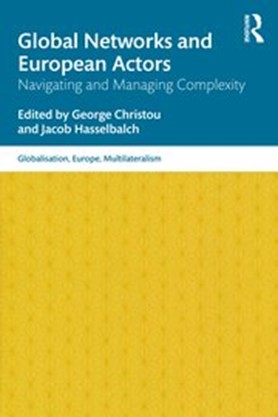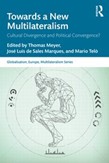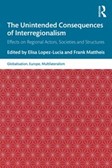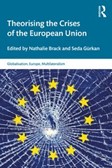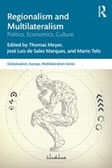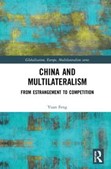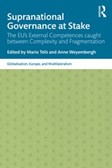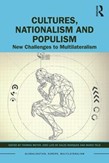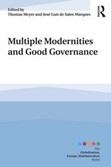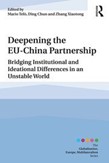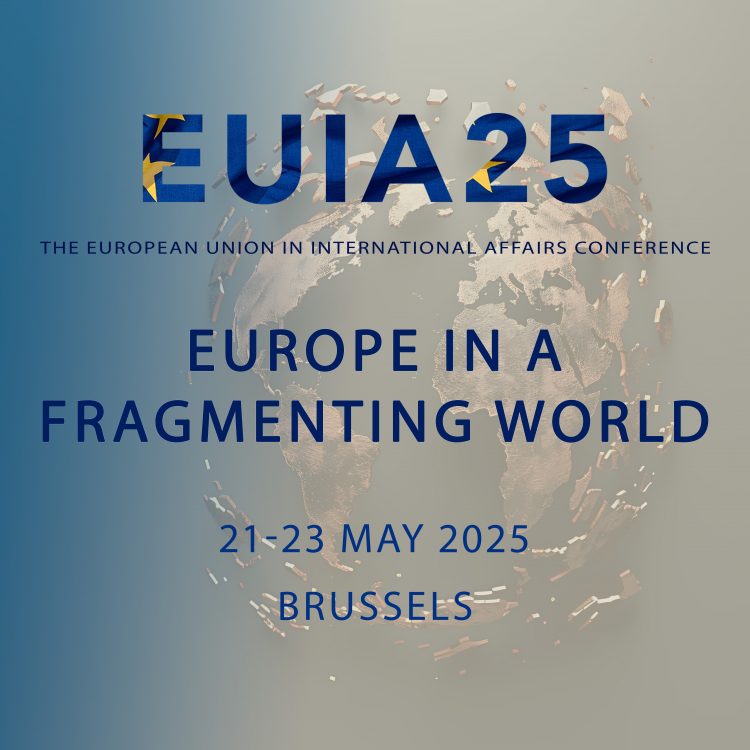Série de livres Routledge: Globalisation, Europe et multilatéralisme
Sur la série
La série offre une plateforme interdisciplinaire pour un travail original sur les institutions, les normes et les pratiques associées à la mondialisation, au multilatéralisme et à l’Union européenne. Chaque volume publié plonge dans une dynamique donnée, façonnant soit le lien mondial-régional, soit le rôle de l’UE dans ce domaine. Il offre ainsi des aperçus originaux sur: la mondialisation et ses défis de gouvernance associés; l’évolution des formes de coopération multilatérale et le rôle des réseaux transnationaux; l’impact des nouvelles puissances mondiales et l’ordre multipolaire corollaire; les leçons tirées du régionalisme comparé et des partenariats interrégionaux; ainsi que les instruments distinctifs que l’UE mobilise dans ses politiques étrangères et ses relations extérieures.
Les volumes, monographies et manuels édités de la série GEM visent tous à contribuer à l’innovation dans les domaines de l’intégration européenne et des études internationales. Un comité consultatif international composé d’éminents universitaires de tous les cinq continents soutient davantage la série avec des contributions et des conseils.
La série est produite sous les auspices d’un comité de rédaction international qui inclut : A. Acharya (American University), S. Breslin (University of Warwick), R. Coman (ULB), M. Cremona (EUI), L. Fawcett (Oxford), A. Gamble (Cambridge), R.O. Keohane (Princeton), N. Levrat (UNIGE), C. Lequesne (IEP-Paris), L. Morlino (LUISS), T. Nakamura (Waseda), Y. Qin (CFAU), U. Salma Bava (JNU), V. Schmidt (Boston University); L. Seabrooke (CBS), K.E. Smith (LSE), A. Weyembergh (ULB), and M. Zürn (WZB).
Depuis décembre 2020, la série inclut 20 titres
Global Networks and European Actors: Navigating and Managing Complexity
Edited by George Christou, Jacob Hasselbalch
Forthcoming – 1st Edition – May 25, ‘21
This book examines the ability of the EU and European actor networks to coherently and effectively navigate, manage and influence debates and policy on the international stage. It also questions whether increasing complexity across a range of critical global issues and networks
Towards a New Multilateralism: Cultural Divergence and Political Convergence?
Edited by Thomas Meyer, José Luís de Sales Marques, Mario Telò
Forthcoming – 1st Edition – March 31, ‘21
This edited book focuses on the dynamic balance between global cultural diversity and multilateral convergence in relevant policy areas that involve actual and potential policy convergences (and divergences): the environment, trade, peace and security, and human rights.
The Unintended Consequences of Interregionalism: Effects on Regional Actors, Societies and Structures
Edited by Elisa Lopez-Lucia, Frank Mattheis
1st Edition – December 31, ‘20
This edited book brings a new analytical angle to the study of comparative regionalism by focussing on the unintended consequences of interregional relations. The book satisfies the need to go beyond the consideration of the success or failure of internationa policies.
Theorising the Crises of the European Union
Edited by Nathalie Brack, Seda Gürkan
1st Edition – December 31, ‘20
This book examines the relevance of integration theories for studying and analyzing the crisis situations faced by the EU since 2009. Ten years on from the start of the ‘age of crisis’, it critically analyzes the impact of the multiple crises’ context on the EU polity and questions the utility of integration theories…
Regionalism and Multilateralism: Politics, Economics, Culture
Edited by Thomas Meyer, José Luís de Sales Marques, Mario Telò
1st Edition – July 23, ‘20
This book discusses the impact of cultural diversities and identities on regional and interregional cooperation, as well as on multilateralism. Employing a comparative approach to organizations such as ASEAN, MERCOSUR, SAARC, and the African and European Unions, this volume seeks to understand their distinctive features and patterns of interaction.
China and Multilateralism: From Estrangement to Competition
By Yuan Feng
1st Edition – July 07, ‘20
This book thoroughly analyzes China’s political ideas regarding the international order and their reflection in China’s engagement in multilateralism. It introduces the debates and discussions that take place among Chinese intellectuals in the study of international relations …
Supranational Governance at Stake: The EU’s External Competences caught between Complexity and Fragmentation
Edited by Mario Telò, Anne Weyembergh
1st Edition – May 14, ‘20
This book examines the varied competences of the European Union (EU) in relation to its capacity to externalize its policy preferences. Specifically, it explores the continued resilience within the EU’s policy toolbox of supranational modes of governance beyond the State…
Cultures, Nationalism and Populism: New Challenges to Multilateralism
Edited by José Luís de Sales Marques, Thomas Meyer, Mario Telò
1st Edition – September 12, 2019
This book examines the role of the cultural factor, and patterns of its interaction with social, economic and political developments, in fostering identity-based new populisms and various forms of political authoritarianism across the globe. Comparing authoritarianism in the Asian and Western context…
Multiple Modernities and Good Governance
Edited by Thomas Meyer, José Luís de Sales Marques
1st Edition – May 09, ‘18
This book represents the first discussion from a political science perspective of the concept of Multiple Modernities in three dimensions. First taking stock of the discussions of the concept itself, the book then connects the concept to more recently developed analytical and normative concepts that concretize it…
Deepening the EU-China Partnership: Bridging Institutional and Ideational Differences in an Unstable World
Edited by Mario Telò, Ding Chun, Zhang Xiaotong
1st Edition – November 20, ‘17
The China-EC/EU relationship, started in 1975, is a highly institutionalized, multidimensional and complex, but to some extent controversial international partnership. It is also challenged within the current unstable world…
Developing EU–Japan Relations in a Changing Regional Context: A Focus on Security, Law and Policies
Edited by Dimitri Vanoverbeke, Takao Suami, Takako Ueta, Nicholas Peeters, Frederik Ponjaert
1st Edition – October 02, 2017
Relations between the EU and East Asia have consistently expanded in recent years, particularly between the EU and Japan. Against the background of negotiations on an economic and strategic partnership agreement, the EU–Japan relationship is set to become…
EU Foreign Policy through the Lens of Discourse Analysis: Making Sense of Diversity
Edited by Caterina Carta, Jean-Frederic Morin
1st Edition – April 28, 2014
Leading scholars in discourse analysis and European foreign policy join forces in this book, marking a real breakthrough in the literature. Not only do they offer original perspectives on European foreign policy, but they bring together various theories on foreign policy discourses…
Interregionalism and the European Union: A Post-Revisionist Approach to Europe’s Place in a Changing World
By Mario Telò, Louise Fawcett, Frederik Ponjaert
1st Edition – October 28, 2015
Is the EU isolated within the emergent multipolar world? Concentrating on interregional relations and focussing on the European Union’s (EU) evolving international role with regards to regional cooperation…
The Politics of Transatlantic Trade Negotiations: TTIP in a Globalized World
By Jean-Frederic Morin, Tereza Novotná, Frederik Ponjaert, Mario Telò
1st Edition – April 28, 2015
By focusing on the wider process of negotiations, this novel volume presents the first systematic analysis of the Transatlantic Trade and Investment Partnership (TTIP). The authors include outstanding scholars and relevant practitioners from across disciplines…
The European Union and Japan: A New Chapter in Civilian Power Cooperation?
Edited by Paul Bacon, Hartmut Mayer, Hidetoshi Nakamura
1st Edition – March 28, 2015
The EU and Japan have one of the most important trade relationships in the world. Fittingly, this book presents a detailed analysis of their bilateral regulatory environment and negotiation processes. Moreover, the two polities have also co-operated extensively…
The European External Action Service and National Foreign Ministries: Convergence or Divergence?
Edited bBy Rosa Balfour, Caterina Carta, Kristi Raik
1st Edition – January 28, 2015
Based on extensive empirical work by a cross-European group of researchers, this book assesses the impact of the creation of the European External Action Service (EEAS) on the national foreign policy-making processes and institutions of the EU member states…
The European Union with(in) International Organisations: Commitment, Consistency and Effects across Time
Edited by Amandine Orsini
1st Edition – October 22, 2014
Since its creation, the European Union (EU) has been a participant in the activities of other International Organisations (IOs) or has been working together with them. Still, little information is available on what this long-term involvement with(in) IOs…
The Eurozone Crisis and the Transformation of EU Governance: Internal and External Implications
Edited by Maria João Rodrigues, Eleni Xiarchogiannopoulou
1st Edition – August 20, 2014
Research on European governance is central to understanding both the process of European integration and its external influence as a laboratory for multilateralism. This volume focuses on the impact of the recent Eurozone crisis and its far-reaching implications…
Globalisation, Multilateralism, Europe: Towards a Better Global Governance?
Edited by Mario Telò
1st Edition – February 26, 2014
This student-friendly textbook offers a comprehensive introduction to globalization studies and the European Union within a multipolar world. It provides its readers with critical analysis of the key concepts of multilateral global and regional governance and Europe’s role …
The EU’s Foreign Policy: What Kind of Power and Diplomatic Action?
By Mario Telò, Frederik Ponjaert
1st Edition – February 28, 2013
A very timely and topical volume concerned with the impact of the Lisbon Treaty on the European Union’s (EU) capacity to further develop a distinctive foreign policy in accordance with the various policy instruments necessary to fulfil its role as a global actor…

